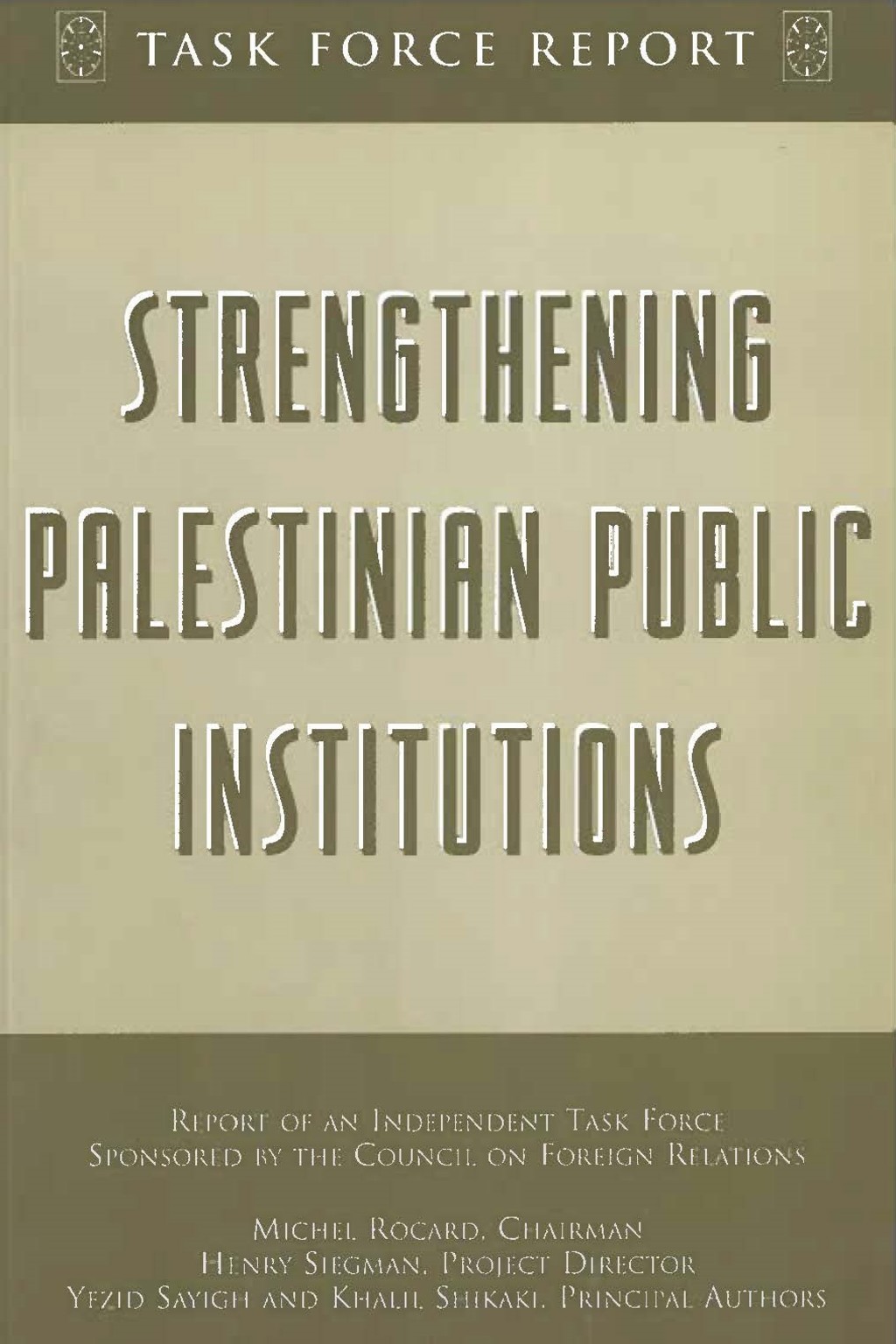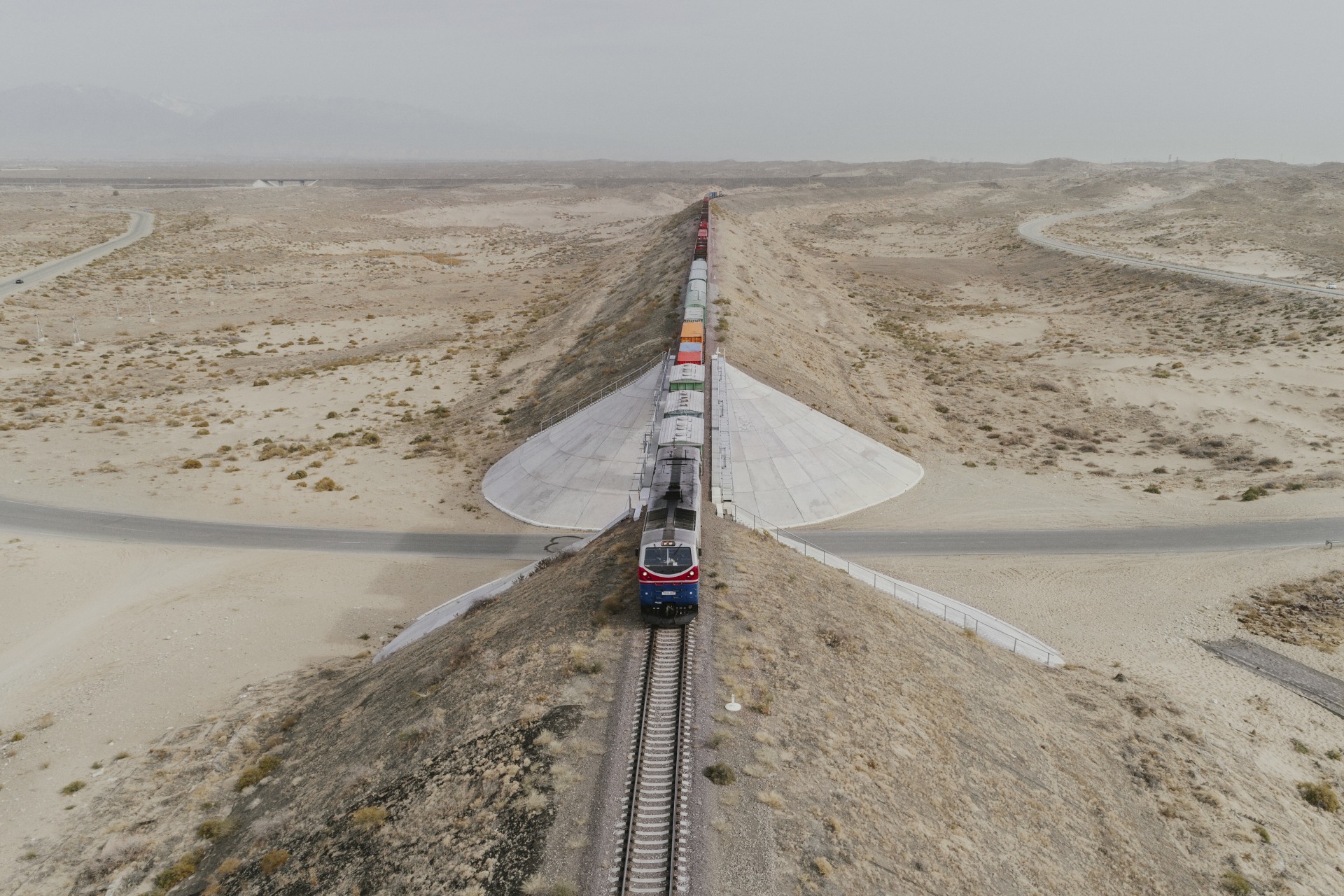Task Force Report No. #22
Strengthening Palestinian Public Institutions
Full Report
- Michel RocardCochair
- Henry SiegmanDirector
What are Task Force Reports?
CFR sponsors Task Forces to assess issues of critical importance to U.S. foreign policy to reach bipartisan consensus on policy recommendations.
Who makes them?
Task Force members aim to reach a meaningful consensus on policy and are solely responsible for the content of their report.
The Palestinian Authority (PA) must improve its ability to govern democratically and effectively—and do so urgently—or risk losing the support of its people, according to this independent Task Force report.
The independent Task Force believes that the PA has made significant achievements to date, but recommends that it go much further in building a more participatory political system and pluralist civil society, as well as developing a free-market economy and sustainable growth. The report notes that although “the PA has achieved levels of service delivery, revenue mobilization, financial accountability, and utilization of international assistance that are at least commensurate with, and in some aspects exceed, those in countries of comparable development and income...much remains to be done.” Specifically, the PA should adopt a constitution; establish accountability for the executive branch to the legislature; centralize all public revenues and expenditures in the Ministry of Finance; and ensure the independence of the judiciary.
Opinion polls among Palestinians show “dissatisfaction with the level of public services, a perception of waste and corruption in the public administration and police, and a loss of faith in the institutions of governance, particularly the Palestinian Legislative Council and the judiciary.”
Confidence in the PA’s institutions affects its contest for legitimacy with radical elements that reject the Oslo accords and claim to do a better job than the PA at delivering certain services to the Palestinian people. This confidence bears on the PA’s ability to negotiate and compromise with Israel and affects Israel’s confidence in the PA’s ability to implement agreements. Good governance is therefore a necessary condition for the success of the peace process. The report, after conducting a comprehensive assessment of the public institutions of the PA, their structure and procedures, and their transparency and accountability, offers a number of steps the PA can take to remedy its problems.
Task Force Members
Task Force Members:
CARL BILDT is chairman of Sweden’s Moderate Party. He was prime minister of Sweden.
HANS-DIETRICH GENSCHER was foreign minister of Germany.
FELIPE GONZALEZ is deputy president of the socialist international. He was prime minister of Spain and secretary general of its Socialist Party.
ABDLATIF AL-HAMAD is director general and chairman of the board of the Arab Fund for Economic and Social Development in Kuwait.
LEE HAMILTON is director of the Woodrow Wilson International Center for Scholars. He was a U.S. congressman for thirty-four years and served as chairman of the House Committee on International Relations.
DOUGLAS HURD is deputy chairman of Coutts and Co. He was foreign secretary of the United Kingdom.
NANCY KASSEBAUM BAKER was U.S. senator from Kansas.
OTTO GRAF LAMBSDORFF is chairman of the board of the Friedrich-Naumann Foundation. He was minister of the economy in Germany.
JACQUES DE LAROSIERE is an adviser of Banque Paribas. Formerly, he was managing director of the International Monetary Fund, governor of the French Central Bank, and president of the European Bank for Reconstruction and Development.
TERJE ROED-LARSEN is special adviser to the Foreign Minister of Norway. He was UN Special Coordinator in the Occupied Territories.
MIGUEL MORATINOS is European Union special envoy to the Middle East peace process. He was ambassador of Spain to Israel.
ROMANO PRODI is president-designate of the European Commission. He was prime minister of Italy.
MARIO SOARES is president of the European Movement. Formerly, he was president of Portugal.
DICK SPRING is Labor Party spokesperson and member of Parliament of Ireland. Formerly, he was deputy prime minister and foreign minister of Ireland.
DOV ZAKHEIM is chief executive officer of SPC International. He was U.S. deputy undersecretary of defense in the Reagan administration.






